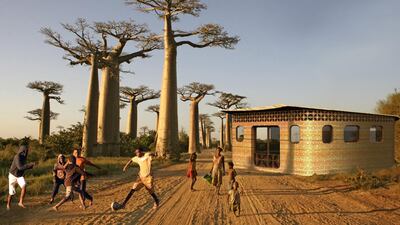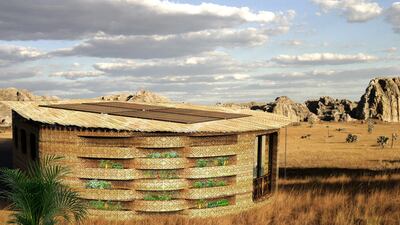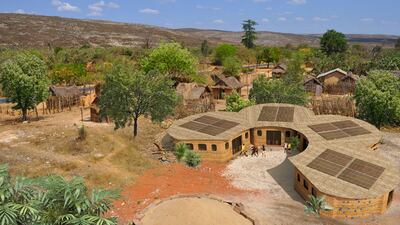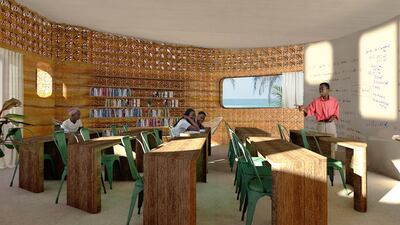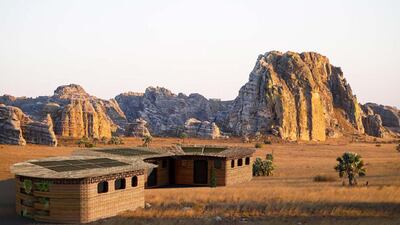Architectural design agency Studio Mortazavi has teamed up with non-profit Thinking Huts to develop what they claim will be the world's first 3D-printed school in southern Madagascar.
Take a look through the gallery above to see renderings of the groundbreaking project.
The pilot school, which will be located in the city of Fianarantsoa, will feature a mix of 3D-printed walls, solar panels and locally sourced construction materials for the roof, door and windows, as well as a vertical farm and climbing wall. It will also have water catchment systems, energy-efficient lighting and compostable toilets, plus the metal roof will be covered with native grass to help it blend in with its surroundings.
Its design will be inspired by a beehive configuration, and the building will be made from pods that can serve various functions, including classrooms and science labs, for example, and facilitate future expansion.
"We believe education is the vital catalyst to solving global issues ranging from gender inequality to poverty," said Thinking Huts founder Maggie Grout. Through local partnerships, she says, "we are building a future where communities have the necessary infrastructure to ensure that education is accessible to all".
Thinking Huts, which is based in Colorado, US, was created with a mission to make education financially and geographically accessible via humanitarian-driven technology, such as 3D-printing. The reason they want to use this kind of technology is because it decreases construction time from months to days, reduces the carbon footprint of the project and costs less.
Madagascar was chosen as the pilot location because of its potential for economic growth, political stability and solar energy opportunities, according to a statement. The first school will be a single-storey building for the university campus of Ecole de Management et d'Innovation Technologique, and will measure 230 square metres, with capacity for up to 20 students.
"The beauty of the pods is that we can build an infinite campus with them as needed by the students and school," Studio Mortazavi founder Amir Mortazavi told design publication Dezeen.
Right now, more than 260 million children do not have access to education, according to Unesco, and 60 per cent of the 1.3 million primary-age students in Madagascar are not enrolled in school.
Asif Khan, a board member of Thinking Huts, says the non-profit “has the potential to transform education for millions globally”.
On this project, they’re working with Finnish 3D technology company Hyperion Robotics, and aiming to break ground at some point this year. Thinking Huts is currently trying to raise funds for the first school, with plans to start building in July or August.
Once it is successful, they aim to scale the project and build schools in partnership with communities throughout Madagascar and, eventually, the world, to “break the cycle of poverty through education”.
